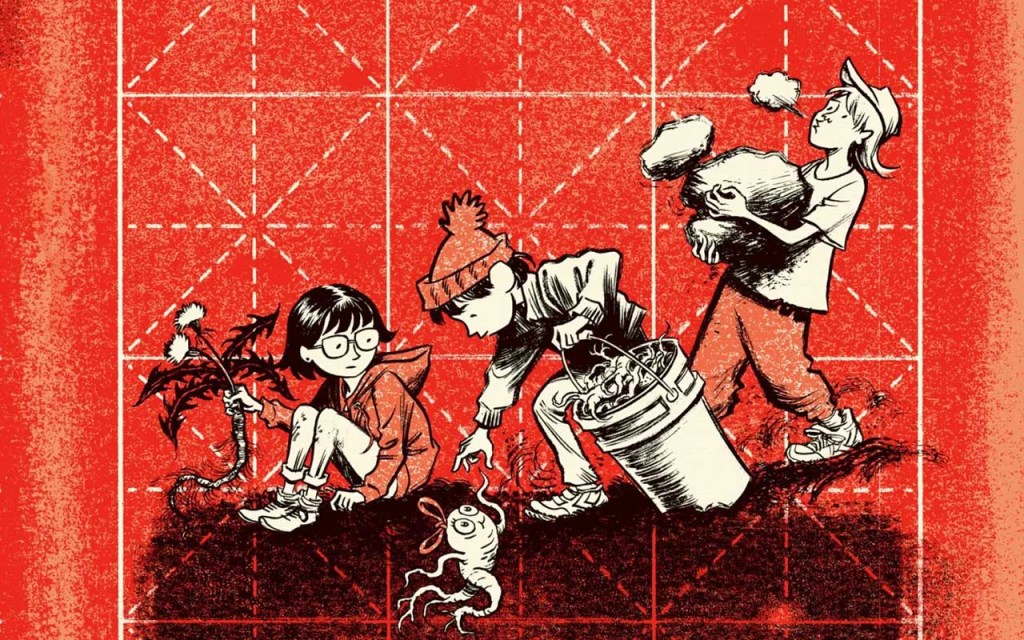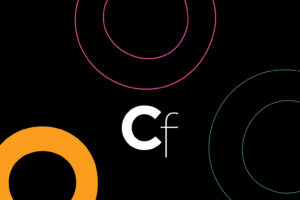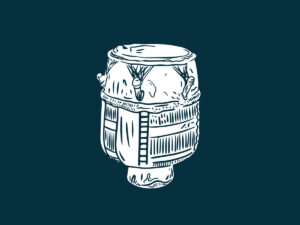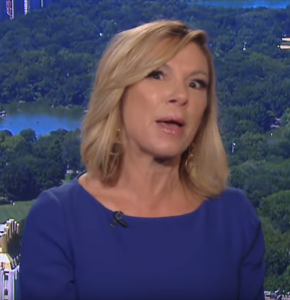A Mystical, Obsessive Encounter With the Ginseng Root



Twenty years ago, Craig Thompson captivated readers with Blankets (2003) — a gripping and fluidly drawn romance set amid the Christian fundamentalism, poverty, and abuse of his childhood. Now, he’s out with a thick new book called Ginseng Roots that digs into territory that Blankets left out: a decade of “picking rocks” on ginseng farms in Marathon, Wisconsin.
That Midwestern soil is, improbably, deeply tied to Asia. On a vacation in China, Thompson, stuck in a middle-aged career rut, injured his drawing hand and was given ginseng as medicine. The root — drawn with big googly eyes — implores him to return home to Marathon and its ginseng farms. One of Thompson’s gifts — and a strength of the comic format, which seamlessly blends interior and exterior worlds — is showing us how a bizarre episode like this can be true.
Originally, Thompson conceived of ginseng as the book’s main character, the way trees are in Richard Powers’s The Overstory (2019). His publisher steered him toward people, but there’s still a sense that the heart of the project is a mystical, obsessive encounter with the root itself. It turns out that Marathon is a world center for the ginseng industry, with a far older history than one might imagine: The Iroquois, whose ancestors came from Asia millennia ago, sometimes smoked it. They called it garent oguen, which means “resembles man.”

The reporting in Ginseng Roots is nuanced — Thompson has cited Joe Sacco (author of Palestine, and the standard setter for graphic journalism) as an influence — and Thompson’s sure-handed lines world-build around voices like Chua Vang, son of humble Hmong ginseng farmers, and Paul Hsu, a Wisconsin ginseng mogul with a surreal connection to Trump.
Graphically, Ginseng Roots is an epic accomplishment. Thompson thinks of the entire page — not just the panel — as his unit, creating a layered, rhizomatic reading experience. While deeply reported, like Sacco’s work, this book feels less like hardcore journalism and more like an immersion in the personal, chaotic order of art.
Thompson’s exquisite brushwork is a big part of that. It’s a boisterous hybrid of styles: Mad Magazine gonzo maximalism meets classical Eastern gesture. The book gets incredible mileage from its limited red-and-black palette, blending analog inking with digital mark-making for delightfully richly textured pages.

But Ginseng Roots isn’t a sugary pleasure. You can sit down and read Blankets in one go, but this book is too wonderfully compressed for that, with the crafted information-density of a farmer’s almanac, demanding slow looking. All this is to say that Ginseng Roots is what it should be: a medicinal herb you steep in.
And it’s the right medicine for the moment. It explores the paradoxes that have burst into the open: Trump’s supporters are often caricatured as irrational conspiracy theorists, but nearly 80% of farm-dependent counties voted for him — practical people who spend harsh winters welding their broken ploughs for the next planting season. This is the sort of disconnect Thompson is so well positioned to humanize. But he also complicates it.
When Trump’s tariffs were announced, I thought immediately of Thompson’s ginseng farmers. Sure enough, there was Will Hsu on PBS Wisconsin, calling tariffs “reliving a nightmare.” This heartland industry — reliant on immigrant labor — is also entirely dependent on exporting to China. Ginseng Roots is a story about the tendril-like global interconnections that form reality, despite how the MAGA regime spins it.
Hsu’s existential predicament echoes a moment in Ginseng Roots when Thompson, working the fields with the Vangs, admits that his new book “might be another failure and ruin me financially.” Art so often feels out of step with capitalism — creative expression might sometimes overlap with money, but at the end of the day, it constitutes its own value system.
“Farmers know that feeling!” Vang replies.

Ginseng Roots: A Memoir (2025), written and illustrated by Craig Thompson and published by Pantheon Graphic Library, an imprint of Penguin Random House, is available for purchase online and in bookstores.




